The "warm floor" system gives comfort in the cold season, even if porcelain stoneware or tile is chosen as the topcoat. However, in order for such a floor covering to last a long time, it is necessary, in addition to observing the installation technology, to choose the correct adhesive composition with the appropriate characteristics. In this article, HouseChief experts will tell you what tile adhesive for underfloor heating is, which is better choose, and also consider its types and features, the best foreign and domestic manufacturers.
Read in the article
- 1 Why do you need a special tile adhesive for underfloor heating
- 2 Varieties in composition
- 2.1 One-component adhesive mixture
- 2.2 Fast hardening two-component adhesive
- 2.3 Cement-based adhesive
- 3 How to choose the best tile adhesive for underfloor heating according to several criteria
- 3.1 Resistance to temperature changes
- 3.2 Ensuring adhesion
- 3.3 Resistance of the adhesive to mechanical stress
- 3.4 Compatibility of glue with finishing materials
- 3.5 Ease of use
- 3.6 Price-quality ratio
- 4 Popular Overseas Tile Adhesives Manufacturers
- 4.1 Ceresit
- 4.2 Bergauf
- 4.3 Knauf
- 4.4 Litokol
- 4.5 Sopro
- 5 Russian brands of tile adhesives
- 5.1 UNIS
- 5.2 Weber
- 5.3 Prospectors
- 5.4 Osnovit
- 6 Features of the use of tiles for underfloor heating
- 7 Common mistakes when buying glue and laying tiles
Why do you need a special tile adhesive for underfloor heating
Adhesives designed for porcelain stoneware and tiles laid on top of the underfloor heating system are distinguished by a high level of thermal conductivity. When using conventional tile adhesive, heat energy is consumed ineffectively.
A mortar for laying tiles on a warm floor is able to withstand a huge number of heating / cooling cycles without losing its characteristics over a wide temperature range. Traditional adhesive for installation of cladding on floors or walls begins to deteriorate after several significant temperature changes, as a result of which the finish will flake off. This does not happen with a specialized adhesive due to the polymer compounds, epoxy resins and plasticizers included in it.
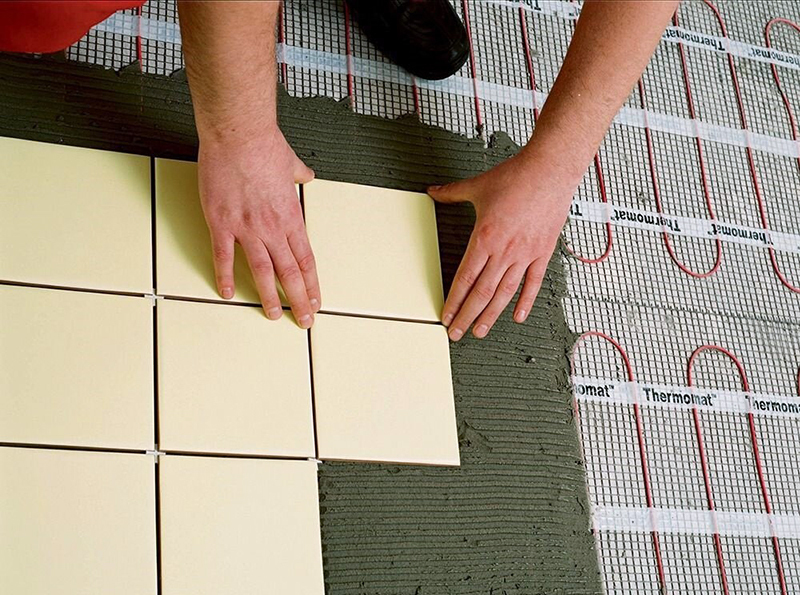
Tile adhesive for underfloor heating systems is resistant to mechanical stress due to the aluminate cement included in the composition. Thanks to this component, a strong and durable coating is provided.
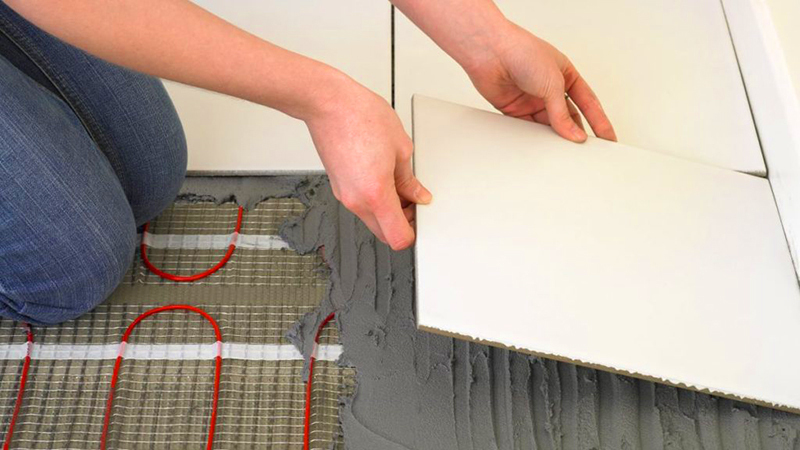
Varieties in composition
All adhesives on the modern construction market are divided into three types: one-, two-component and cement-based. To select the adhesive that is most suitable for installing tiles on heated floors, you need to have an idea of the characteristics of each variety. Consider the varieties of tile adhesive solution that differ in basic composition.
One-component adhesive mixture
This type of glue is convenient to use, since it is realized in the form of a ready-made paste, packaged in plastic containers of different volumes. The adhesive solution contains acrylic resin and modifiers. One-component mixtures harden within 20-25 minutes, which gives enough time to adjust the laid tiles. The finished paste has high adhesion and elasticity and is excellent for beginners with little experience in laying floor tiles.
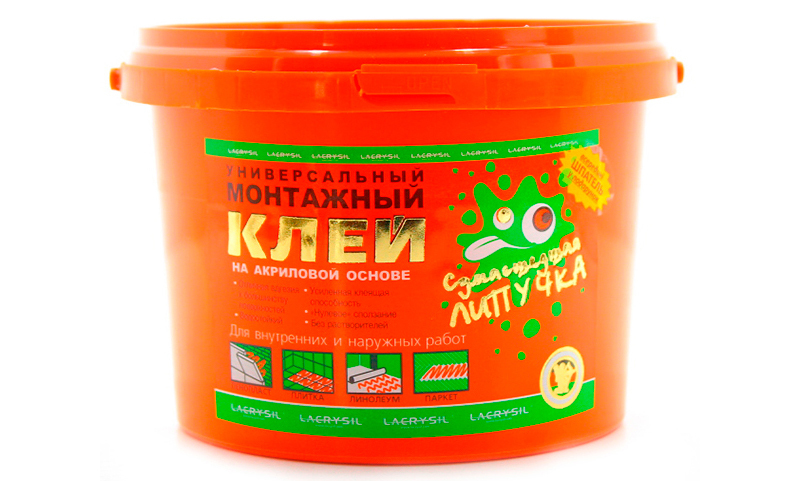
Fast hardening two-component adhesive
The fast-curing two-component or "reactive" adhesive is mixed immediately before use by combining two main components, namely epoxy resin and polyurethane. This type of adhesive easily tolerates temperature changes, has high elasticity and adhesion. Thanks to this, the tiles are securely fixed to substrates made of any materials. Two-component adhesive is excellent for arranging waterproofing layers for bathrooms and kitchens. In addition, it does not shrink, which is important.
For your information! The finished two-component solution must be worked out no later than 50 minutes (the exact time is indicated by the manufacturer on the package). Therefore, working alone, it is worth purchasing glue packaged in small containers.
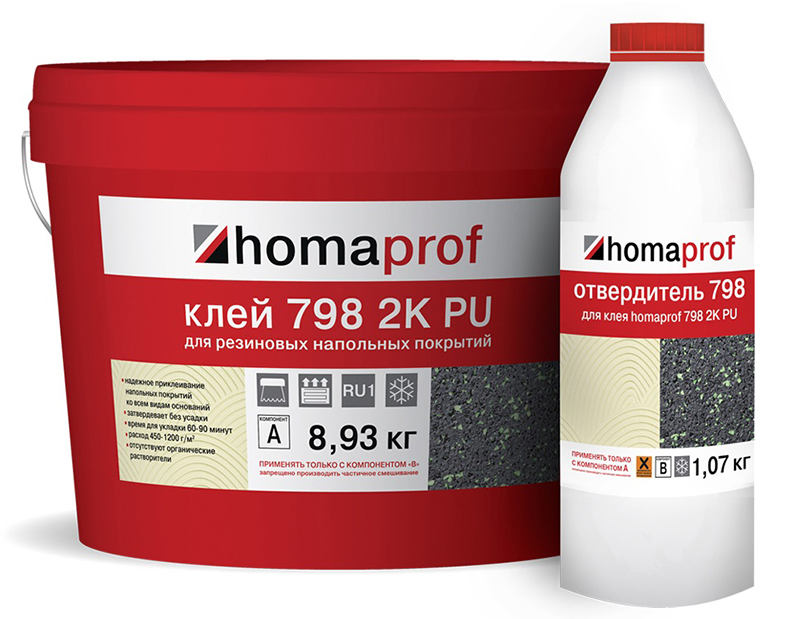
Cement-based adhesive
The cement-based adhesive mixture, despite the presence of polymer compositions, is still popular. It is made from Portland cement, river sand and plasticizers. The glue is sold dry and prepared just before the actual laying of the tiles. The composition of the mixture may contain different components in different proportions, on which elasticity, adhesion and strength depend.
Important! When choosing an adhesive for laying tiles on a warm floor, give preference to products from well-known manufacturers, since they are of better quality than mixtures of little-known brands.
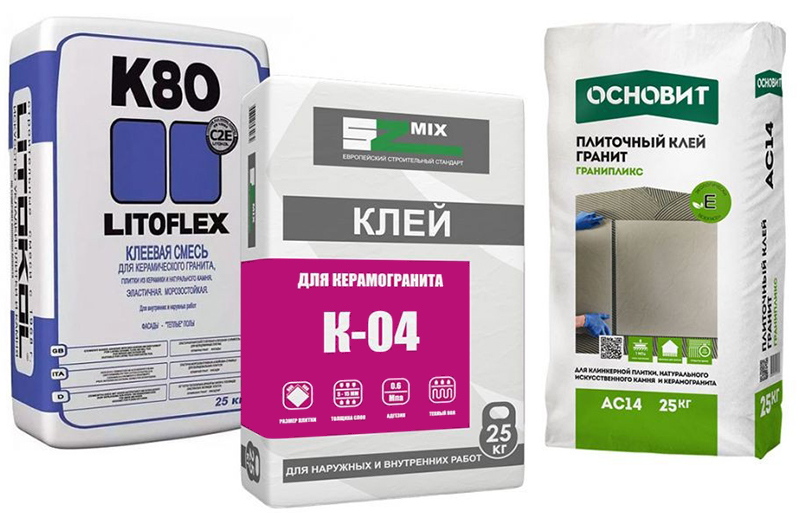
How to choose the best tile adhesive for underfloor heating according to several criteria
Since the materials that make up the "warm floor" system are subject to various influences, high requirements are imposed on it. This is especially true for the adhesive composition. Tile adhesive must be flexible, withstand temperature extremes and mechanical stress, be compatible with other materials and have a high degree of adhesion. The adhesive mixture for laying tiles must meet certain performance characteristics.
Resistance to temperature changes
The advantage of underfloor heating is the ability to raise or lower the temperature in accordance with the wishes of the owner of the house or apartment. Ordinary tile glue quickly deteriorates from frequent temperature changes, while high-quality compositions are able to withstand critical values from -30 to +90 ° C.
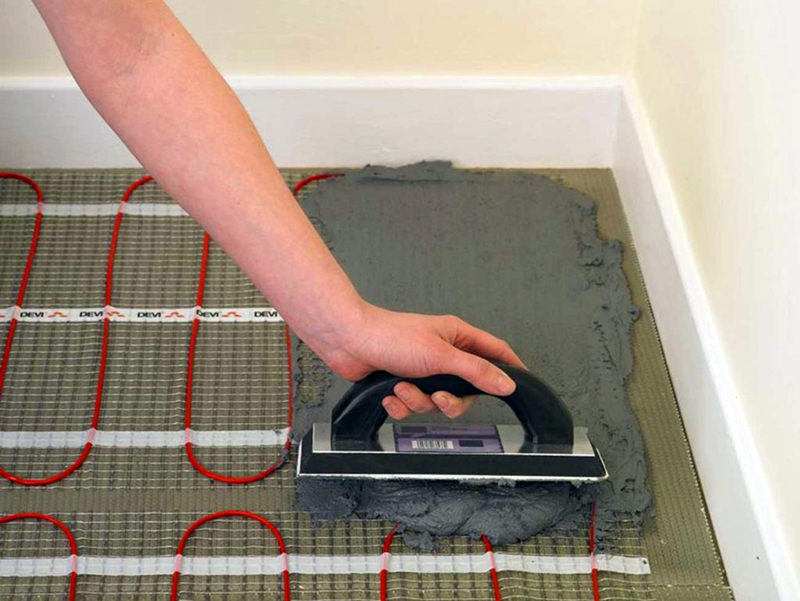
Ensuring adhesion
Grip is an important parameter. Since for underfloor heating systems, mainly porcelain stoneware tiles are used, which differ significant weight, then ordinary glue is not able to provide good adhesion to a smooth surface facing material. Therefore, for laying the cladding, it is recommended to choose cement or polymer compositions with the addition of a large amount of plasticizers, which will ensure high-quality adhesion to the surface.
Resistance of the adhesive to mechanical stress
No less important is the resistance of the adhesive to high and multidirectional loads. The glue with aluminate cement will provide maximum strength and resist mechanical stress.
Compatibility of glue with finishing materials
When the adhesive is applied, it adheres tightly to the main surface and cladding. The materials from which they are made can be completely different, respectively, and the chemical reaction with the bonding solution will also occur in different ways. This must be taken into account, since the durability and quality of the cladding installation depend on the compatibility of the adhesive with the tiles and the base. As a rule, on the packaging of the adhesive, the manufacturer indicates with which material it is compatible.
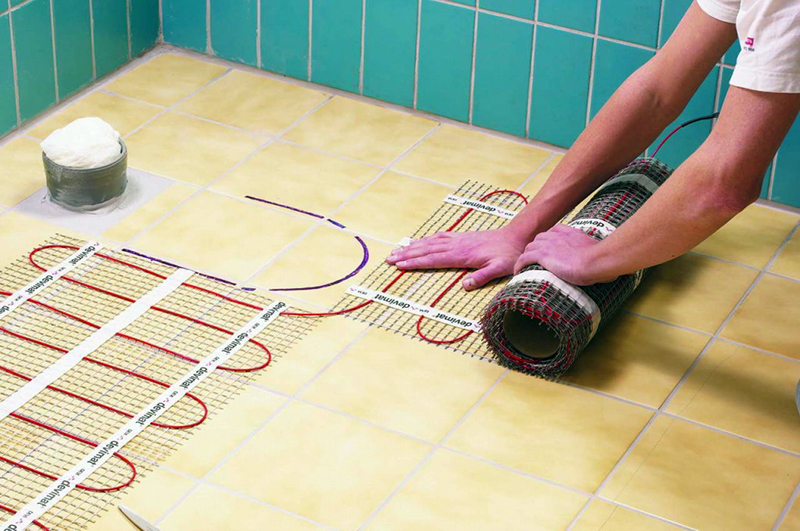
Ease of use
Ready-made adhesives are convenient to use, but they are more expensive than dry mixes and must be produced immediately. However, special cement-based compositions are in great demand among specialists, since it is possible to prepare exactly the amount of glue that is needed at the moment.
Price-quality ratio
The popularity of the manufacturer and its pricing policy should not be the main criteria. It is not at all necessary to purchase the products of a promoted brand, but you should not choose tile adhesive for underfloor heating from little-known companies. Saving on quality can turn into problems in the installation and operation of flooring. The best option is adhesive solutions with an optimal price / quality ratio.
Popular Overseas Tile Adhesives Manufacturers
Experienced finishers prefer materials from trusted manufacturers. Adhesive for laying tiles on a warm floor must have high technical characteristics: adhesion, bulk density, operating temperature range, frost resistance, etc. Few manufacturers can offer truly high quality products, so let's take a look at the most popular brands trusted by professionals.
Ceresit
The products of the German manufacturer Ceresit are the most popular among Russian finishing professionals. The company offers high performance adhesives that can be used for laying tiles on various types of underfloor heating. Adhesives from this manufacturer are optimal for the installation of porcelain stoneware and marble.
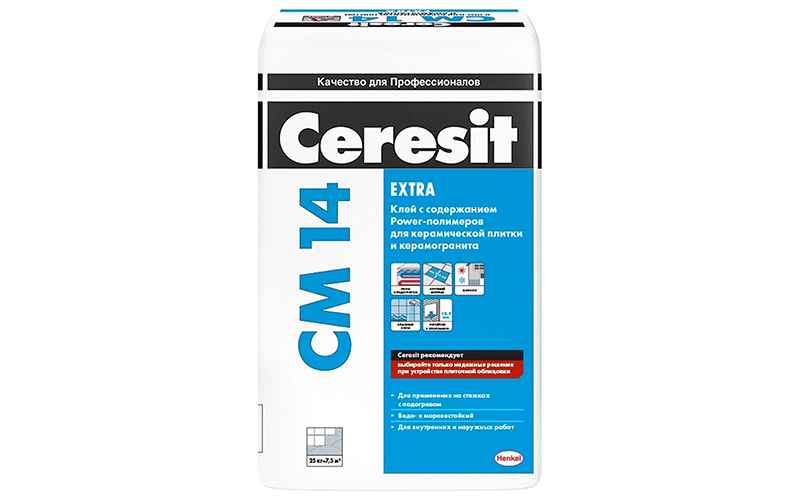
Bergauf
This is a German-Russian company that produces quality products for finishing works. Its floor tile adhesive is able to withstand temperature fluctuations in the range from -50 to +180 ° C during operation and does not allow the tiles to slide during installation. This is a great solution for inexperienced finishers.
Knauf
Due to their high characteristics, the adhesive compositions of the German company Knauf are widely used for the installation of ceramic and porcelain tiles, artificial and natural stone. The glue of this brand is resistant to high humidity, high loads and constant temperature changes. The plasticity of the composition allows you to adjust the position of the tiles in just 10 minutes, and the operation of the floor is possible after 24 hours.
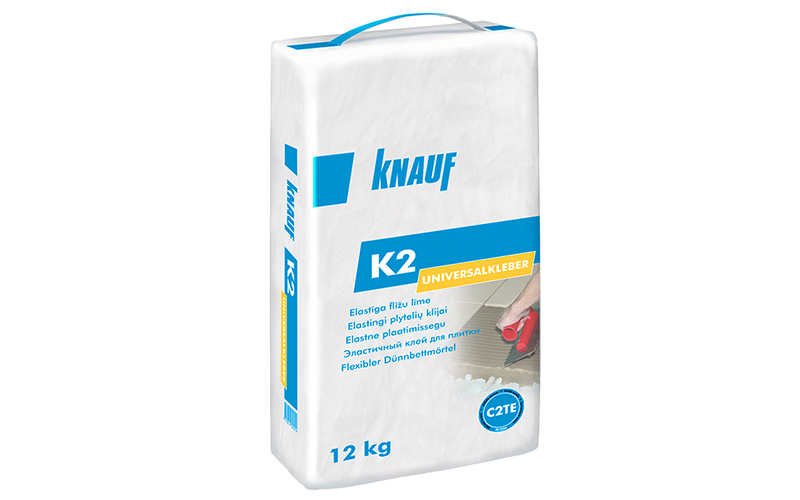
Litokol
An Italian brand that produces quality tile adhesive with high performance, namely fast adhesion, versatility, plasticity, excellent adhesion, fast strength and elasticity. Adhesives from this manufacturer are not suitable for beginners, since they set quickly, and the time for adjustment is no more than 15 minutes.
Sopro
Adhesives from the German company Sopro are appreciated by finishing specialists for their high quality, versatility and excellent performance. They are suitable for laying tiles in rooms with high humidity and for tiling underfloor heating. The products of this brand are the choice of professionals.
Russian brands of tile adhesives
Among the manufacturers of high-quality adhesives for installing tiles on heated floors, there are also domestic brands. Below are the most popular Russian brands.
UNIS
A Russian manufacturer offering a high-quality line of adhesive mixtures for the installation of all types of tiles. This type of brand product is distinguished by moisture and heat resistance, good adhesion, strength and durability of the created coating.
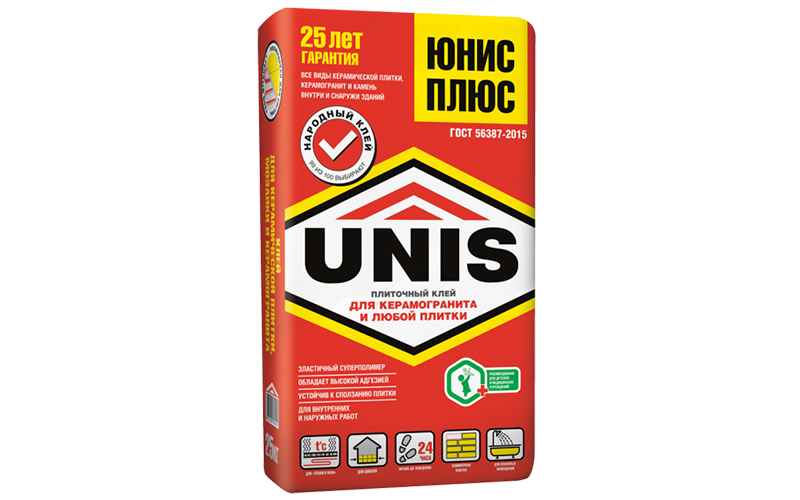
Weber
Weber has developed an adhesive specially for the installation of large-format porcelain stoneware tiles, which is also suitable for underfloor heating. It has high adhesion, and the material can be adjusted within 15 minutes, but the heating system can be operated no earlier than 2 weeks after the installation of the cladding.
Prospectors
Another manufacturer of quality tile adhesive for heated floors. Its use is allowed only on surfaces that are not subject to deformation. Differs in fast adhesion and high adhesion.
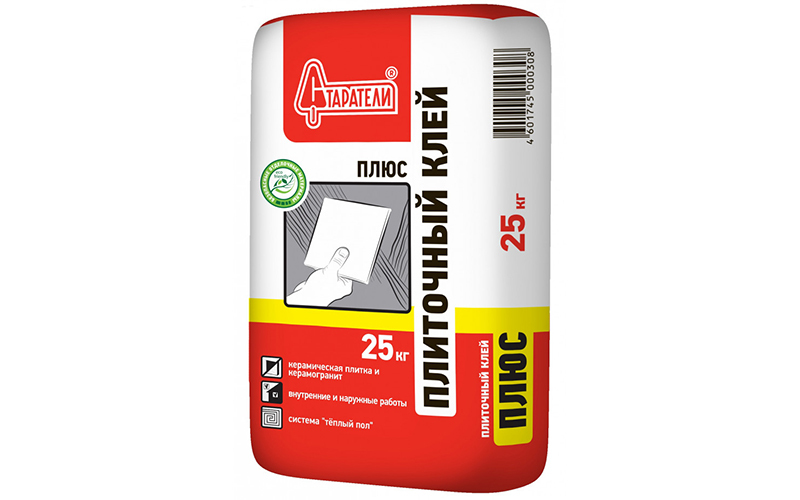
Osnovit
In the line of the Russian manufacturer Osnovit there is an adhesive composition developed specifically for facing warm floors. Its pot life is 4 hours, and the correction time of the installed tiles is 15 minutes. The optimal solution for both beginners and professionals.
Features of the use of tiles for underfloor heating
Many are interested in the question of whether it is necessary to soak the tiles before laying them on the underfloor heating system. This is not required, since modern adhesive solutions contain components that significantly improve adhesion.
When laying large tiles, you should not make small seams, since this is not only a decorative element, but also a compensator for expansion with a significant increase in temperature. Also, do not install at temperatures below +5 ° C.
The tiles should be laid on a perfectly flat base so that the aesthetic appearance of the surface is not lost during installation. In addition, it is necessary to remove all excess solution without waiting for it to dry completely.
Do not turn on the underfloor heating system before the adhesive is completely dry and hardened.
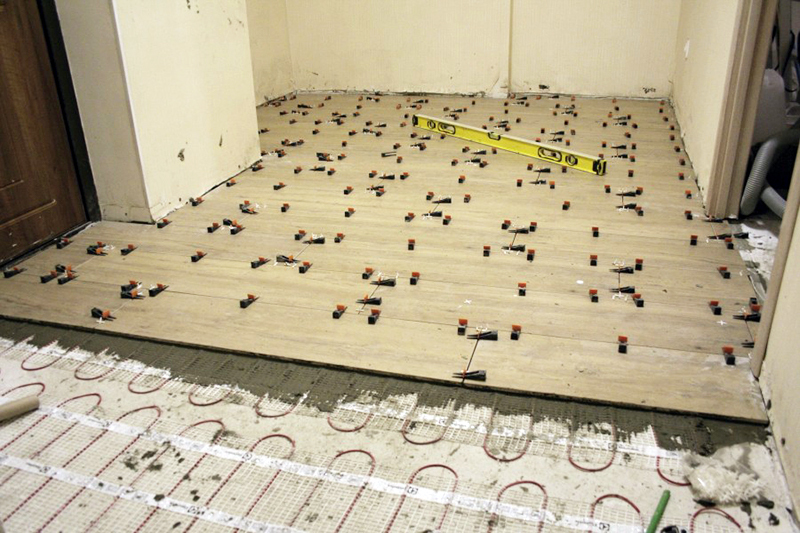
Common mistakes when buying glue and laying tiles
Beginners who do not have sufficient tiling experience almost always make the same mistakes. Let's consider the most common ones:
- Lack of damper seams. When the temperature changes, the materials contract and expand, which can lead to deformation and destruction of the tile. To avoid this, it is necessary to leave damper or expansion joints between the wall and the cladding.
- Using a universal adhesive solution. Many sellers convince that such glue is suitable for any conditions, but this is not the case. The characteristics of universal compounds are an order of magnitude lower than those of highly specialized mixtures.
- The tiles have not been tested. Before laying the tiles on a warm floor, you need to make a preliminary layout and check the cladding for defects. It is better to do this in advance than to find the right tile in a hurry.
- Laying the tiles on an adhesive that has already started to set. This cannot be done, since the cladding will come off very quickly. Therefore, the best option would be to renew the adhesive solution.
- Walking on the floor and turning on the heating until the glue hardens and dries completely. This is fraught with the fact that the tile will move out of its place, and the adhesive composition will crack, which means that the cladding will quickly fail.
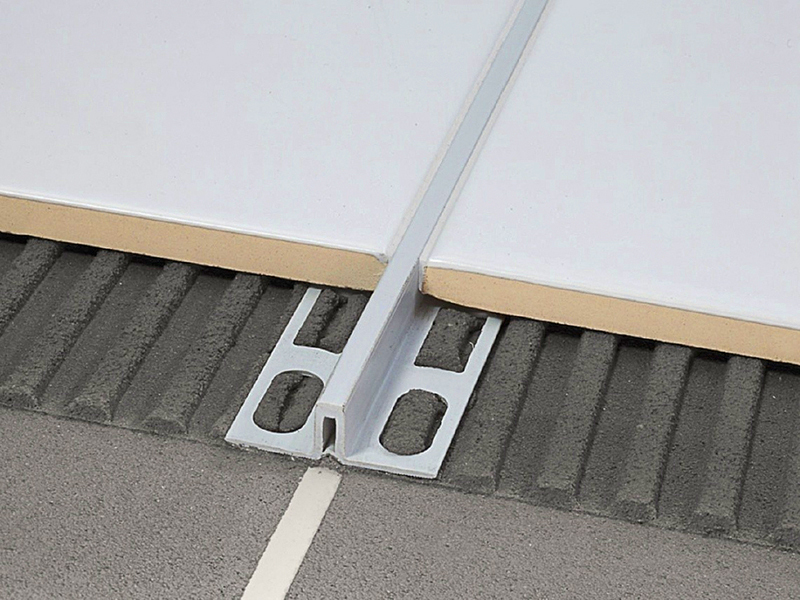
When choosing an adhesive for laying tiles on a warm floor, you need to take into account a large number of factors, namely the type of base, the type of heating system and the type of cladding. If you have little experience in finishing work, it is recommended to choose an adhesive with a high pot life and a long time to correct.
In the 80s he worked in one NGO, then the hammer enamel was sintered. It turned out great, n ...
While in the summer I lived at the dacha, I saw many different situations and no one fined anyone. Uch ...
You cannot find a normal apartment for such a sum in Moscow. Even for a country house that ...
Thank you. Briefly and clearly...
Karting. I want to help children! & nbs ...
Now there is a very interesting and efficient option for heating - plasterboard pa ...
Everything is gorgeous, but always the emphasis on the ratchet. And for me, for example, it is technologically not p ...
yes indeed. if you don’t get them, no one showed up for the whole year, they began to hear ...
Why sheathe the house initially with vapor barrier? The meaning of it? To create a place of condensation ...
A little more than a month ago, I was looking for an Electrolux heating kit for a loggia. We have a lodge ...
In general, I support it, only concrete does not lose its properties after wintering, especially if you w ...
They took a heating kit Revolts into the bathroom. When there was no heating in the interseason ...

